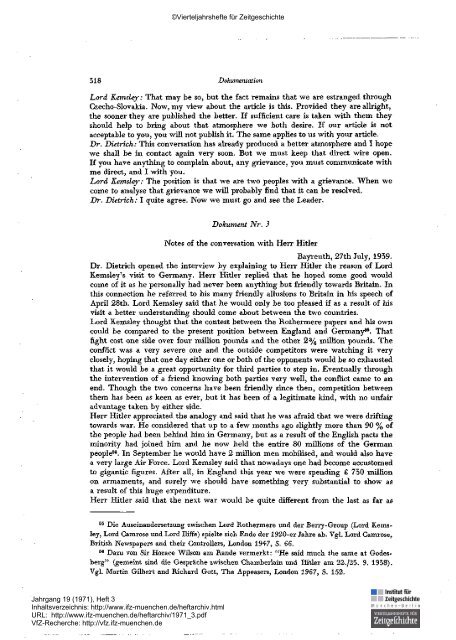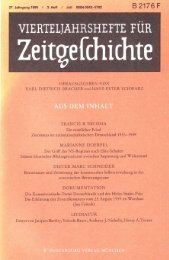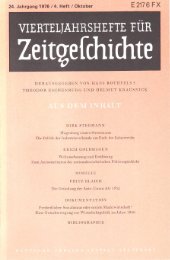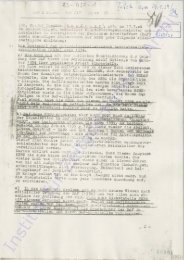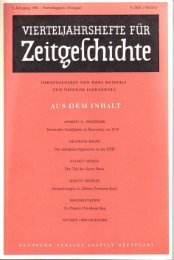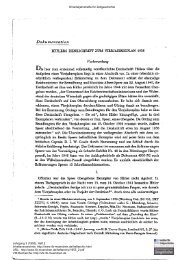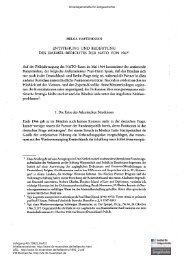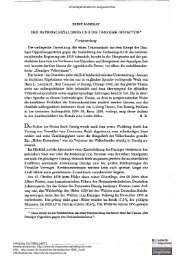VIERTELJAHRSHEFTE FÜR ZEITGESCHICHTE - Institut für ...
VIERTELJAHRSHEFTE FÜR ZEITGESCHICHTE - Institut für ...
VIERTELJAHRSHEFTE FÜR ZEITGESCHICHTE - Institut für ...
Sie wollen auch ein ePaper? Erhöhen Sie die Reichweite Ihrer Titel.
YUMPU macht aus Druck-PDFs automatisch weboptimierte ePaper, die Google liebt.
318 Dokumentation<br />
Lord Kemsley: That may be so, but the fact remains that we are estranged through<br />
Czecho-Slovakia. Now, my view about the article is this. Provided they are allright,<br />
the sooner they are published the better. If sufficient care is taken with them they<br />
should help to bring about that atmosphere we both desire. If our article is not<br />
acceptable to you, you will not publish it. The same applies to us with your article.<br />
Dr. Dietrich: This conversation has already produced a better atmosphere and I hope<br />
we shall be in contact again very soon. But we must keep that direct wire open.<br />
If you have anything to complain about, any grievance, you must communicate with<br />
me direct, and I with you.<br />
Lord Kemsley: The position is that we are two peoples with a grievance. When we<br />
come to analyse that grievance we will probably find that it can be resolved.<br />
Dr. Dietrich: I quite agree. Now we must go and see the Leader.<br />
Dokument Nr. 3<br />
Notes of the conversation with Herr Hitler<br />
Bayreuth, 27th July, 1939.<br />
Dr. Dietrich opened the interview by explaining to Herr Hitler the reason of Lord<br />
Kemsley's visit to Germany. Herr Hitler replied that he hoped some good would<br />
come of it as he personally had never been anything but friendly towards Britain. In<br />
this connection he referred to his many friendly allusions to Britain in his speech of<br />
April 28th. Lord Kemsley said that he would only be too pleased if as a result of his<br />
visit a better understanding should come about between the two countries.<br />
Lord Kemsley thought that the contest between the Rothermere papers and his own<br />
could be compared to the present position between England and Germany 55 . That<br />
fight cost one side over four million pounds and the other 2 3/4 million pounds. The<br />
conflict was a very severe one and the outside competitors were watching it very<br />
closely, hoping that one day either one or both of the opponents would be so exhausted<br />
that it would be a great opportunity for third parties to step in. Eventually through<br />
the intervention of a friend knowing both parties very well, the conflict came to an<br />
end. Though the two concerns have been friendly since then, competition between<br />
them has been as keen as ever, but it has been of a legitimate kind, with no unfair<br />
advantage taken by either side.<br />
Herr Hitler appreciated the analogy and said that he was afraid that we were drifting<br />
towards war. He considered that up to a few months ago slightly more than 90 % of<br />
the people had been behind him in Germany, but as a result of the English pacts the<br />
minority had joined him and he now held the entire 80 millions of the German<br />
people 56 . In September he would have 2 million men mobilised, and would also have<br />
a very large Air Force. Lord Kemsley said that nowadays one had become accustomed<br />
to gigantic figures. After all, in England this year we were spending £ 730 million<br />
on armaments, and surely we should have something very substantial to show as<br />
a result of this huge expenditure.<br />
Herr Hitler said that the next war would be quite different from the last as far as<br />
55 Die Auseinandersetzung zwischen Lord Rothermere und der Berry-Group (Lord Kemsley,<br />
Lord Camrose und Lord Iliffe) spielte sich Ende der 1920-er Jahre ab. Vgl. Lord Camrose,<br />
British Newspapers and their Controllers, London 1947, S. 66.<br />
56 Dazu von Sir Horace Wilson am Rande vermerkt: "He said much the same at Godesberg"<br />
(gemeint sind die Gespräche zwischen Chamberlain und Hitler am 22./25. 9. 1938).<br />
Vgl. Martin Gilbert and Richard Gott, The Appeasers, London 1967, S. 152.


